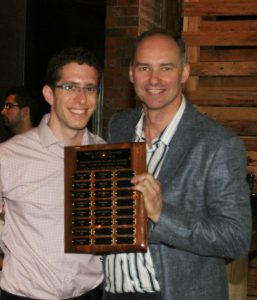After the official MIT commencement ceremonies, Thomas Roemer, LGO’s executive director, announced the best thesis winner at LGO’s annual post-graduation celebration. This year’s winner was Jonathan Zanger, who developed a predictive model using machine learning at Massachusetts General Hospital. “The thesis describes breakthrough work at MGH that leverages machine learning and deep clinical knowledge to develop a decision support tool to predict discharges from the hospital in the next 24-48 hours and enable a fundamentally new and more effective discharge process,” said MIT Sloan School of Management Professor Retsef Levi, one of Zanger’s thesis advisors and the LGO management faculty co-director.
Applying MIT knowledge in the real world

Zanger, who received his MBA and an SM in Electrical Engineering and Computer Science, conducted his six-month LGO internship project at MGH that sought to enable a more proactive process of managing the hospital’s bed capacity by identifying which surgical inpatients are likely to be discharged from the hospital in the next 24 to 48 hours. To do this, Zanger grouped patients by their surgery type, and worked to define and formalize milestones on the pathway to a post-operative recovery by defining barriers that may postpone patients’ discharge. Finally, he used a deep learning algorithm which uses over 900 features and is trained on 3000 types of surgeries and 20,000 surgical discharges. LGO thesis advisor Retsef Levi stated that “in my view, this thesis work represents a league of its own in terms of technical depth, creativity and potential impact.” Zanger was able to have true prediction for 97% of patients discharged within 48 hours. This helps to limit overcrowding and operational disruptions and anticipate capacity crises.
A group of faculty, alumni and staff review the theses each year to determine the winner. Thomas Sanderson (LGO ’14), LGO alumni and thesis reviewer stated that Zanger’s thesis showed “tremendous extensibility and smart solution architecture decisions to make future work easy. Obvious and strong overlap of engineering, business, and industry. This is potentially revolutionary work; this research advances the current state of the art well beyond anything currently available for large hospital bed management with obvious and immediate impact on healthcare costs and patient outcomes. The theory alone is hugely noteworthy but the fact that the work was also piloted during the thesis period is even more impressive. LGO has done a lot of great work at MGH but this is potentially the widest reaching and most important.”
Zanger, who earned his undergraduate degree Physics, Computer Science and Mathematics from the Hebrew University of Jerusalem, will return to Israel after graduation and resume service as an Israeli Defense Forces officer.
~

